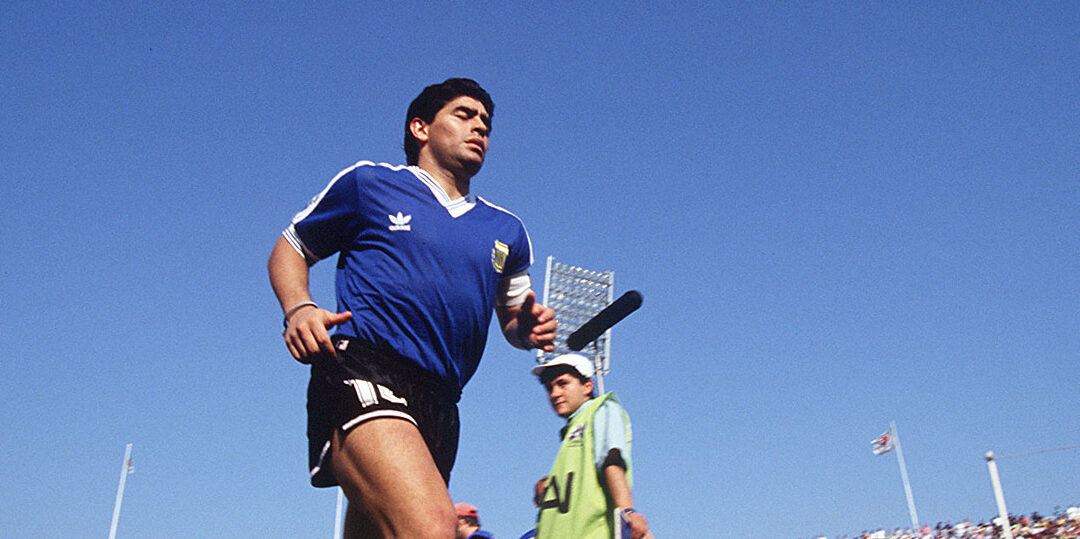
Diego Maradona: “I have seen God”
Diego Maradona could do things that a human being normally could not do. His disciples, therefore, considered him to be the extended arm and hand of the Almighty – and at some point, it is said, the day came when he believed them.
In the summer of 2018, the World Cup in Russia is overshadowed by a bizarre appearance in the stands in St. Petersburg. During Argentina’s match against Nigeria, Diego Maradona, visibly threatened by madness, is repeatedly broadcast in close-up to the whole world.
“Ar-gen-ti-na!” he roars.
“Li-o-nel!” he pleads.
But above all, he shouts crazy things across the stands that no one understands. The former king of football is completely out of control. He alternately asks a woman sitting next to him to dance with ecstatic twitches, leans dangerously over the railing to accept the homage of his fans, starts wild chants, gives the stadium and the world the extended middle finger and takes a nap in between. When Lionel Messi scores the eagerly awaited goal, the veins of his predecessor on the people’s hero throne swell, at the peak of the jubilation (“Messi! Messi!”) his eyes completely pop out of his head, and when he leaves the stands after the final whistle, he has to be supported.
Maradona was taken to hospital and the football world expected the worst that night. But the next day, the born-again gave the all-clear on Instagram, writing defiantly: “Diego will be around for a while.” Now the sad news reached us yesterday: the while is over.
Diego Maradona is dead.
This time it is true. It has to be said explicitly because many will not believe it at first, too many times Maradona has been declared dead. We remember well a fellow Argentine reporter who said at the 2010 World Cup in South Africa: “A cat has seven lives, but with Maradona, we stopped counting.” It was the same after the bizarre standoff in St Petersburg: as a result of a cardiac arrest, a red-hot busybody spread on the internet, the football king had died in hospital. Credibly and indignantly, Maradona contradicted this a few days later in his TV show:
Do I look like I’m dead?
At least he didn’t look well.
Diego Armando Maradona. You can’t do justice to this terrific, crazy and unique figure of football with one obituary, you need two: one for the supernatural football god – and the other for the poor guy off the pitch who couldn’t always manage without the ball on his foot and got lost in the labyrinth of life.
Yet this life had started well. Those who are born in Fiorito, this unfortunate district of Buenos Aires, don’t really have a chance, but the little fuzzy-headed boy made the most of it. At the age of 16, “El Pibe de Oro”, the golden boy, was already old enough for his first international match, and his Argentine national coach Cesar Luis Menotti said: “What Diego can do with his feet, we mortals can’t even do with our hands.” Not much later, the prodigy thrilled at FC Barcelona and SSC Napoli, as the world’s best footballer.
Above all, he was the king of the Neapolitans, and unforgettable for all those who were there is his one-man show before the 1989 UEFA Cup final against VfB Stuttgart. 70,000 Swabians were sitting in the Neckar Stadium when the magician scooped the ball onto his foot during the warm-up at the kick-off circle and began to juggle. The ball bounced onto his other foot, then onto his knee, chest, head, rested briefly on his neck, and back it went, head, chest, knee, foot. This went on for minutes, not once did the magician allow the ball to make contact with the ground, and at some point 70,000 Swabians were no longer sitting, but standing and celebrating (“Diego! Diego!”) this circus acrobat who gave them the greatest experience of their spectators’ lives. I was shooting a film that evening for the programme “Sport under the microscope” and stood in amazement on the sidelines, and when Maradona, so as not to jeopardise the punctual kick-off, finally dropped the ball, my cameraman said: “Now we can go. That’s the best we’re going to get today.”
The only time Maradona was even better was at the 1986 World Cup in Mexico when he elevated his country to the throne. In the quarter-finals, he danced past six English players from the halfway line and completed the goal of the century. He went on to become FIFA Footballer of the Century, along with Pele. A jury of experts chose the Brazilian, an internet jury the Argentinian. The nonsensical scholarly war over who was the better of the two was later settled by Brazilian World Cup coach Carlos Alberto Parreira with the question: “Who was better – Monet or van Gogh?”
You know what, write what you want.
But soon it was on to the darker news. One day, Hector Pezzella, the director of the “Güemes” clinic in Buenos Aires, treated his compatriot who had been admitted with unclear symptoms and was quoted with the confusing diagnosis: “I think Maradona thinks he’s a god.”
Were these the late effects of that legendary World Cup match against England in 1986? For Maradona had scored a second legendary goal that day, unfairly, irregularly, with his bare fist. “That was the hand of God,” he claimed after the final whistle. Did Maradona think he was an extension of the Almighty? Or God himself?
That’s as good as we get today.
His disciples, his worshippers, encouraged him in this belief. They founded their own church for their saint, the “Iglesia Maradoniana”, whereby they did not write “Dios”, the Spanish word for God, but “D+10+S” – the “10” stood for Maradona’s biblical back number. His professing fans regularly met on his birthdays, worshipped him devoutly and sold T-shirts as his apostles that read: “I have seen God.” In the long run, only the strongest last. At some point, Maradona could no longer keep it together – and his fake friends, who supplied him with drugs, took care of the rest.
In his mid-30s, he began to talk about dying for the first time. At the 1994 World Championships, he, the crowned king, had been caught doping. He announced that he was not killing himself only because of his daughters, and once he said on television: “Many always wanted to see me dead – I am dead.” The world then understood how serious it was, at the very latest, from the following pictures: A small, fat star bounces into the TV studio for a talk show, dances the tango with a beauty queen named Cecilia – and collapses. Afterwards, he is seen again in a wheelchair in hospital, and the medical world whispers about “irreparable defects”, points to the destruction of brain cells due to excessive cocaine consumption and sees the star psychologically disintegrating.
Depression, aggression, paranoia, suicidal tendencies. Maradona was then sent to Switzerland, to a clinic on Lake Biel, to fight his drug addiction, and at the height of the therapy the professor demanded of him: “I want you to play big again at the 1998 World Cup.” Maradona nodded. Shortly afterwards, however, he shoved behind in the face of a stadium steward in England with his trousers down, and in Alicante, Spain, he smashed two doors, a table and five chairs in a hotel. A heart attack followed, by which time he was 43. And before he was 50, he was poking around in the fog of his life with the pole in such a way that a psychiatrically knowledgeable observer reported: “In a hospital, one thought he was Einstein and another Newton, and when Maradona said he was Maradona, they laughed.”
By any means necessary, Maradona at times tried to destroy himself in the deadly cycle between genius and madness. His liver was affected, and compounding the problem was his corpulence, which swelled to 140 kilos. He made the headlines as the “Maratonna”, and in the greatest emergency, his stomach was cut in half. He then went into temporary exile in Cuba, had Fidel Castro give him a revolutionary cap, and in the end, the shortest of all headlines was: “He’s crazy.”
But he lived. “The bearded one,” Maradona said, “always saves me.” He didn’t mean the bearded man in Cuba, but the one in the sky who once again lent him his hand: Maradona did indeed rise from the dead – and became national coach.
Especially those journalists at whom Maradona had occasionally shot with an air rifle were sceptical at first. In the past, they scoffed, Diego had been magical with the ball at his foot, but as a coach, he had a board in front of his head. He then paid them back brilliantly, or rather: genitally. After the successful qualification for the 2010 World Cup, he offered the reporters in the press conference: “And now you can all give me a blowj…” – and shot them down.
Then, at the World Cup in South Africa, everything went quite well at first. And when Maradona performed, there wasn’t a dry eye in the house; I witnessed it in the “Soccer City” stadium in Johannesburg. His Gauchos had just beaten the Mexicans 3:1, when an Argentine colleague in the press conference was already thinking ahead – and asked Maradona about the next opponent in the quarter-finals, the Germans. “No, no, no,” he grumbled sullenly, “today we talk about our victory and tomorrow about Germany.”
The reporters continued to press.
Didn’t you listen, I’m not saying anything about Germany!
Just one word, Diego, one of them begged …
“You know what,” Maradona then went ballistic, “write whatever you want.” And then he passed his thick, steaming Havana again, which one of his henchmen had kept warm for him while the master spoke.
Maradona was on fire. He was El Diego the Great once more. Every day he was the talk of the town – with diamonds in his ears and a rosary wrapped around his fingers, he magnetically attracted every camera, every step, every blink of an eye was broadcast live – and Maradona promised that if he won the World Cup he would run naked through Buenos Aires. Then it went splat. 0:4 against Germany. Out.
Diego Maradona, the once idolised player, was henceforth increasingly pitied and ridiculed. He did strange things, continued to befriend questionable leaders (as he had done with Ghadafi in Libya), took to the stage in the election campaign in Venezuela for Chavez and later for Maduro (“I am his soldier”), and bitter words now frequently made the rounds about him, from “full of crap” to “crazy”. The World Cup appearance in St. Petersburg matched this. Shortly afterwards, he had himself driven around a stadium in Belarus and announced: “I am now president of the Dinamo Brest club.” What he did there for a short time has never been known exactly, but it is said to have been the best contract of his life after all. In the end, a sheikh in Dubai, a Mexican second-division club and a club in Buenos Aires also paid good money to be allowed to adorn themselves with the old world star who could do everything as long as he had a ball at his foot.
The final word should belong to Ryan Giggs. The Welshman, who used to dribble elegantly at Manchester United, was only a small light compared to the Argentine – but he knew what he was talking about when he said: “Today there is Lionel Messi or Cristiano Ronaldo. But I’ve seen things from Diego Maradona that I’ve never seen from anyone else in the history of football.”



